Report: Legal and Ethical Dilemmas in Healthcare Practice in Australia
VerifiedAdded on 2023/06/10
|9
|2864
|402
Report
AI Summary
This report examines the legal and ethical dilemmas arising in Australian healthcare, using a case study of a nurse caring for a 65-year-old patient, Mr. Ross, diagnosed with colorectal cancer. The report delves into issues of patient confidentiality, the nurse's ethical responsibilities, and end-of-life care considerations. It explores legal breaches of confidentiality, such as when information can be disclosed, and ethical dilemmas faced by nurses, referencing the Code of Ethics for Nurses in Australia. The analysis covers the legal and ethical implications of Mr. Ross's situation, including his expressed desire to end his life. The report concludes with an action plan to address the challenges presented in the case study, emphasizing the importance of early diagnosis, counseling, and upholding the value of life. The report highlights the complexities of healthcare practice and the importance of ethical decision-making.
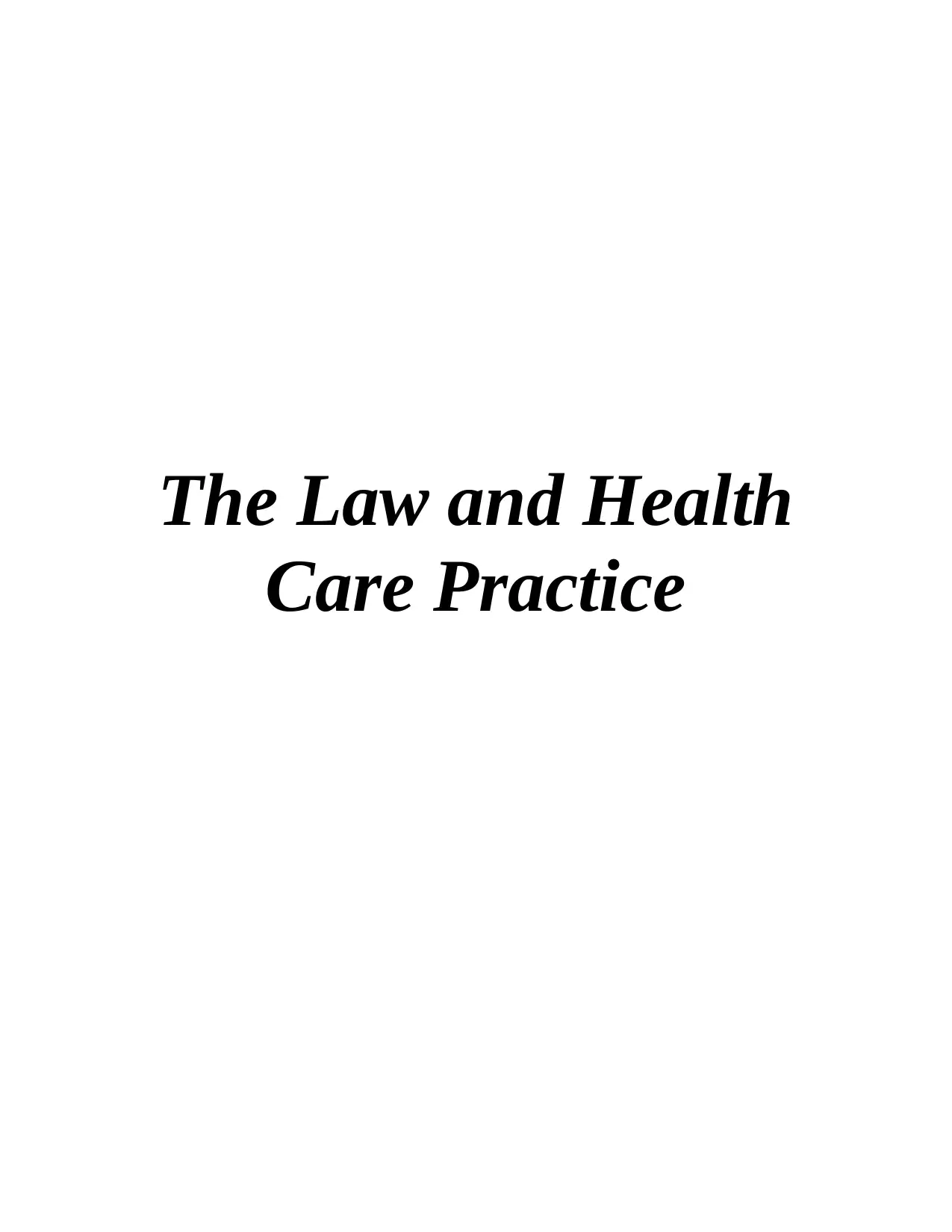
The Law and Health
Care Practice
Care Practice
Paraphrase This Document
Need a fresh take? Get an instant paraphrase of this document with our AI Paraphraser
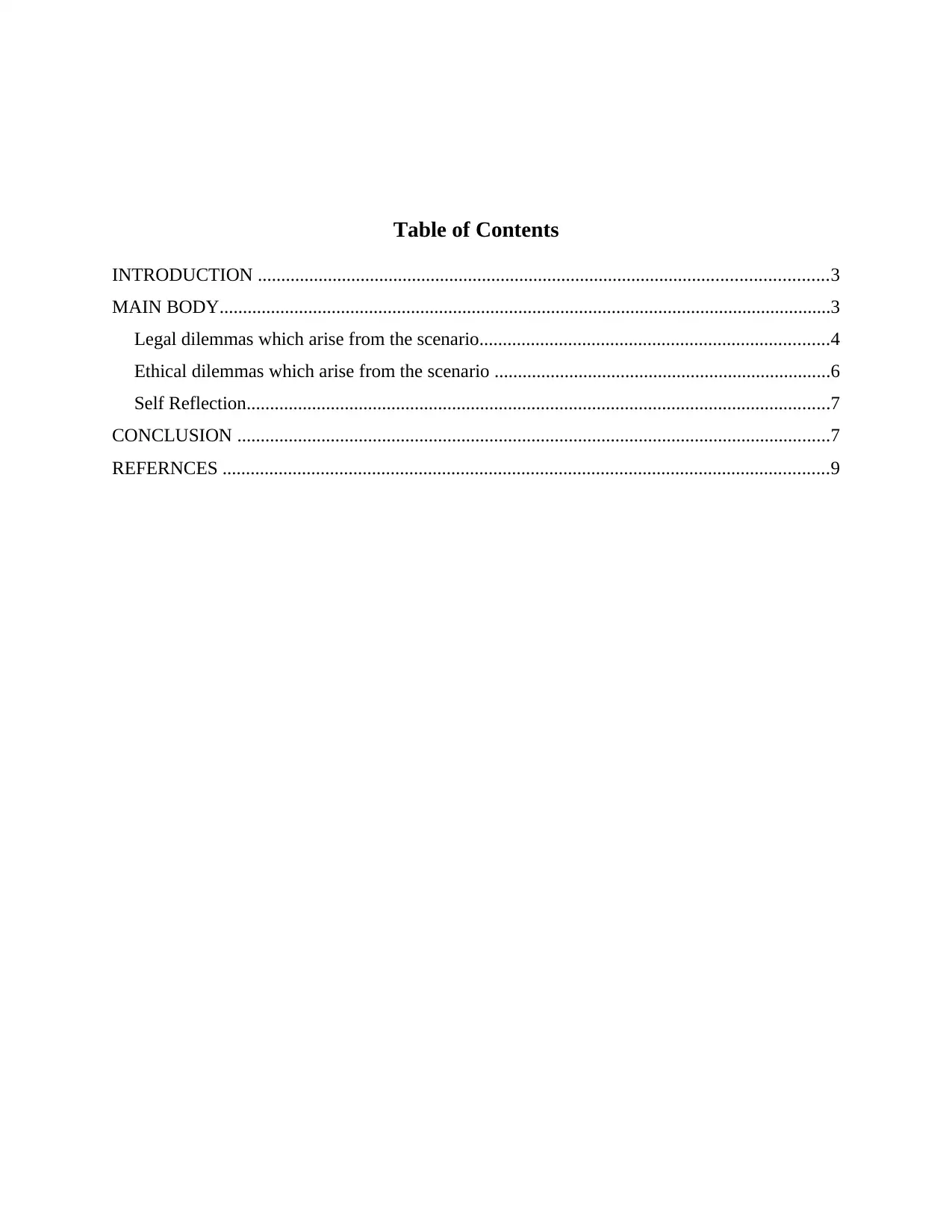
Table of Contents
INTRODUCTION ..........................................................................................................................3
MAIN BODY...................................................................................................................................3
Legal dilemmas which arise from the scenario...........................................................................4
Ethical dilemmas which arise from the scenario ........................................................................6
Self Reflection.............................................................................................................................7
CONCLUSION ...............................................................................................................................7
REFERNCES ..................................................................................................................................9
INTRODUCTION ..........................................................................................................................3
MAIN BODY...................................................................................................................................3
Legal dilemmas which arise from the scenario...........................................................................4
Ethical dilemmas which arise from the scenario ........................................................................6
Self Reflection.............................................................................................................................7
CONCLUSION ...............................................................................................................................7
REFERNCES ..................................................................................................................................9
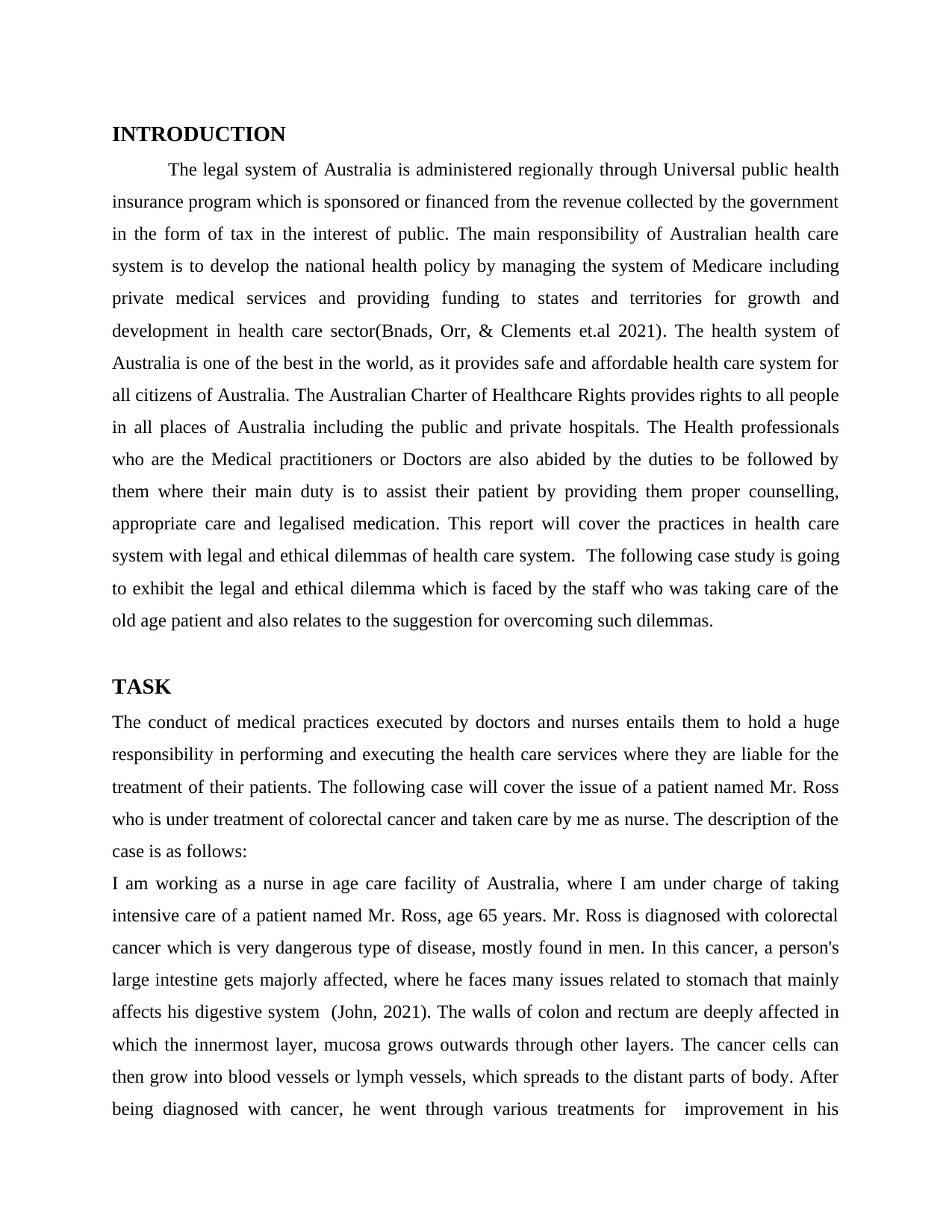
INTRODUCTION
The legal system of Australia is administered regionally through Universal public health
insurance program which is sponsored or financed from the revenue collected by the government
in the form of tax in the interest of public. The main responsibility of Australian health care
system is to develop the national health policy by managing the system of Medicare including
private medical services and providing funding to states and territories for growth and
development in health care sector(Bnads, Orr, & Clements et.al 2021). The health system of
Australia is one of the best in the world, as it provides safe and affordable health care system for
all citizens of Australia. The Australian Charter of Healthcare Rights provides rights to all people
in all places of Australia including the public and private hospitals. The Health professionals
who are the Medical practitioners or Doctors are also abided by the duties to be followed by
them where their main duty is to assist their patient by providing them proper counselling,
appropriate care and legalised medication. This report will cover the practices in health care
system with legal and ethical dilemmas of health care system. The following case study is going
to exhibit the legal and ethical dilemma which is faced by the staff who was taking care of the
old age patient and also relates to the suggestion for overcoming such dilemmas.
TASK
The conduct of medical practices executed by doctors and nurses entails them to hold a huge
responsibility in performing and executing the health care services where they are liable for the
treatment of their patients. The following case will cover the issue of a patient named Mr. Ross
who is under treatment of colorectal cancer and taken care by me as nurse. The description of the
case is as follows:
I am working as a nurse in age care facility of Australia, where I am under charge of taking
intensive care of a patient named Mr. Ross, age 65 years. Mr. Ross is diagnosed with colorectal
cancer which is very dangerous type of disease, mostly found in men. In this cancer, a person's
large intestine gets majorly affected, where he faces many issues related to stomach that mainly
affects his digestive system (John, 2021). The walls of colon and rectum are deeply affected in
which the innermost layer, mucosa grows outwards through other layers. The cancer cells can
then grow into blood vessels or lymph vessels, which spreads to the distant parts of body. After
being diagnosed with cancer, he went through various treatments for improvement in his
The legal system of Australia is administered regionally through Universal public health
insurance program which is sponsored or financed from the revenue collected by the government
in the form of tax in the interest of public. The main responsibility of Australian health care
system is to develop the national health policy by managing the system of Medicare including
private medical services and providing funding to states and territories for growth and
development in health care sector(Bnads, Orr, & Clements et.al 2021). The health system of
Australia is one of the best in the world, as it provides safe and affordable health care system for
all citizens of Australia. The Australian Charter of Healthcare Rights provides rights to all people
in all places of Australia including the public and private hospitals. The Health professionals
who are the Medical practitioners or Doctors are also abided by the duties to be followed by
them where their main duty is to assist their patient by providing them proper counselling,
appropriate care and legalised medication. This report will cover the practices in health care
system with legal and ethical dilemmas of health care system. The following case study is going
to exhibit the legal and ethical dilemma which is faced by the staff who was taking care of the
old age patient and also relates to the suggestion for overcoming such dilemmas.
TASK
The conduct of medical practices executed by doctors and nurses entails them to hold a huge
responsibility in performing and executing the health care services where they are liable for the
treatment of their patients. The following case will cover the issue of a patient named Mr. Ross
who is under treatment of colorectal cancer and taken care by me as nurse. The description of the
case is as follows:
I am working as a nurse in age care facility of Australia, where I am under charge of taking
intensive care of a patient named Mr. Ross, age 65 years. Mr. Ross is diagnosed with colorectal
cancer which is very dangerous type of disease, mostly found in men. In this cancer, a person's
large intestine gets majorly affected, where he faces many issues related to stomach that mainly
affects his digestive system (John, 2021). The walls of colon and rectum are deeply affected in
which the innermost layer, mucosa grows outwards through other layers. The cancer cells can
then grow into blood vessels or lymph vessels, which spreads to the distant parts of body. After
being diagnosed with cancer, he went through various treatments for improvement in his
⊘ This is a preview!⊘
Do you want full access?
Subscribe today to unlock all pages.

Trusted by 1+ million students worldwide
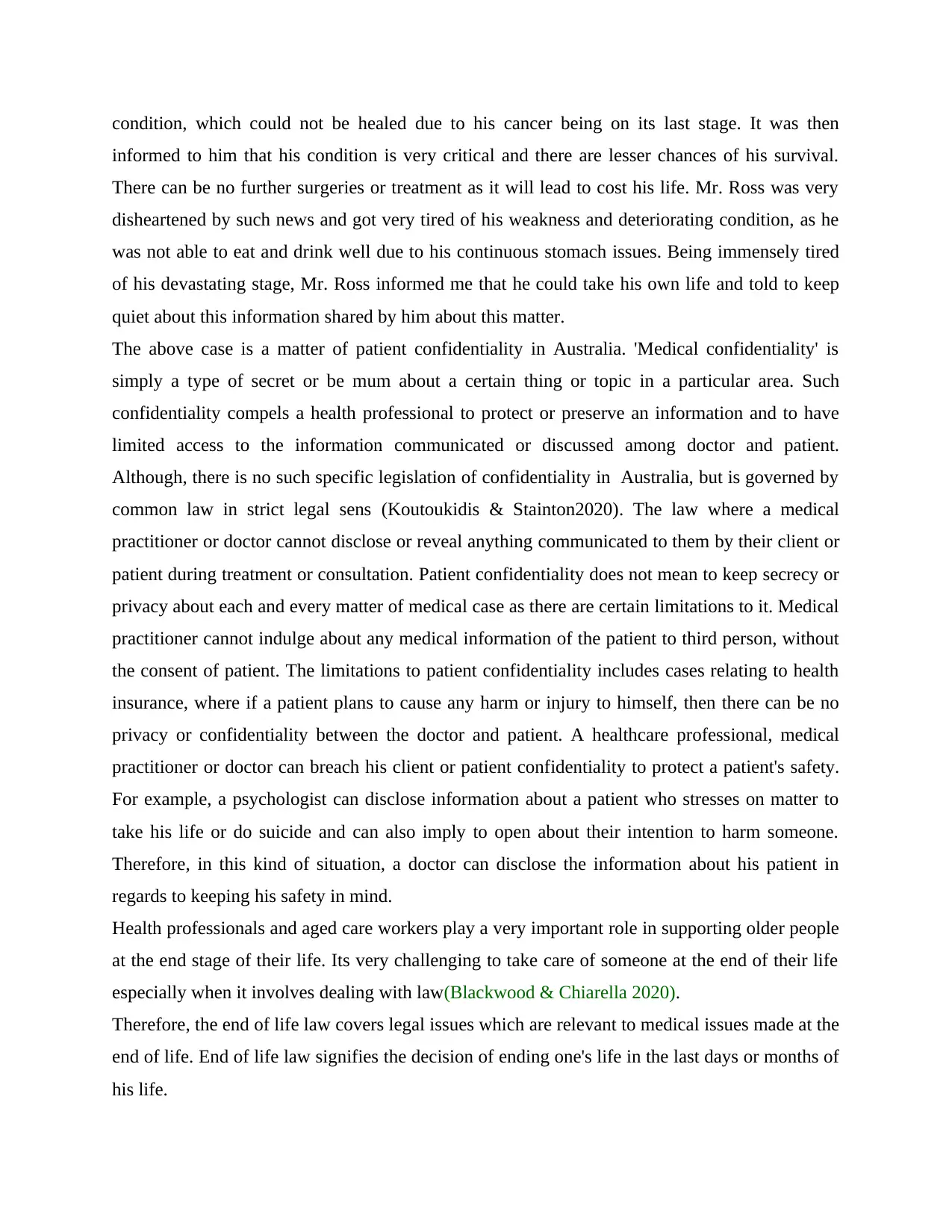
condition, which could not be healed due to his cancer being on its last stage. It was then
informed to him that his condition is very critical and there are lesser chances of his survival.
There can be no further surgeries or treatment as it will lead to cost his life. Mr. Ross was very
disheartened by such news and got very tired of his weakness and deteriorating condition, as he
was not able to eat and drink well due to his continuous stomach issues. Being immensely tired
of his devastating stage, Mr. Ross informed me that he could take his own life and told to keep
quiet about this information shared by him about this matter.
The above case is a matter of patient confidentiality in Australia. 'Medical confidentiality' is
simply a type of secret or be mum about a certain thing or topic in a particular area. Such
confidentiality compels a health professional to protect or preserve an information and to have
limited access to the information communicated or discussed among doctor and patient.
Although, there is no such specific legislation of confidentiality in Australia, but is governed by
common law in strict legal sens (Koutoukidis & Stainton2020). The law where a medical
practitioner or doctor cannot disclose or reveal anything communicated to them by their client or
patient during treatment or consultation. Patient confidentiality does not mean to keep secrecy or
privacy about each and every matter of medical case as there are certain limitations to it. Medical
practitioner cannot indulge about any medical information of the patient to third person, without
the consent of patient. The limitations to patient confidentiality includes cases relating to health
insurance, where if a patient plans to cause any harm or injury to himself, then there can be no
privacy or confidentiality between the doctor and patient. A healthcare professional, medical
practitioner or doctor can breach his client or patient confidentiality to protect a patient's safety.
For example, a psychologist can disclose information about a patient who stresses on matter to
take his life or do suicide and can also imply to open about their intention to harm someone.
Therefore, in this kind of situation, a doctor can disclose the information about his patient in
regards to keeping his safety in mind.
Health professionals and aged care workers play a very important role in supporting older people
at the end stage of their life. Its very challenging to take care of someone at the end of their life
especially when it involves dealing with law(Blackwood & Chiarella 2020).
Therefore, the end of life law covers legal issues which are relevant to medical issues made at the
end of life. End of life law signifies the decision of ending one's life in the last days or months of
his life.
informed to him that his condition is very critical and there are lesser chances of his survival.
There can be no further surgeries or treatment as it will lead to cost his life. Mr. Ross was very
disheartened by such news and got very tired of his weakness and deteriorating condition, as he
was not able to eat and drink well due to his continuous stomach issues. Being immensely tired
of his devastating stage, Mr. Ross informed me that he could take his own life and told to keep
quiet about this information shared by him about this matter.
The above case is a matter of patient confidentiality in Australia. 'Medical confidentiality' is
simply a type of secret or be mum about a certain thing or topic in a particular area. Such
confidentiality compels a health professional to protect or preserve an information and to have
limited access to the information communicated or discussed among doctor and patient.
Although, there is no such specific legislation of confidentiality in Australia, but is governed by
common law in strict legal sens (Koutoukidis & Stainton2020). The law where a medical
practitioner or doctor cannot disclose or reveal anything communicated to them by their client or
patient during treatment or consultation. Patient confidentiality does not mean to keep secrecy or
privacy about each and every matter of medical case as there are certain limitations to it. Medical
practitioner cannot indulge about any medical information of the patient to third person, without
the consent of patient. The limitations to patient confidentiality includes cases relating to health
insurance, where if a patient plans to cause any harm or injury to himself, then there can be no
privacy or confidentiality between the doctor and patient. A healthcare professional, medical
practitioner or doctor can breach his client or patient confidentiality to protect a patient's safety.
For example, a psychologist can disclose information about a patient who stresses on matter to
take his life or do suicide and can also imply to open about their intention to harm someone.
Therefore, in this kind of situation, a doctor can disclose the information about his patient in
regards to keeping his safety in mind.
Health professionals and aged care workers play a very important role in supporting older people
at the end stage of their life. Its very challenging to take care of someone at the end of their life
especially when it involves dealing with law(Blackwood & Chiarella 2020).
Therefore, the end of life law covers legal issues which are relevant to medical issues made at the
end of life. End of life law signifies the decision of ending one's life in the last days or months of
his life.
Paraphrase This Document
Need a fresh take? Get an instant paraphrase of this document with our AI Paraphraser
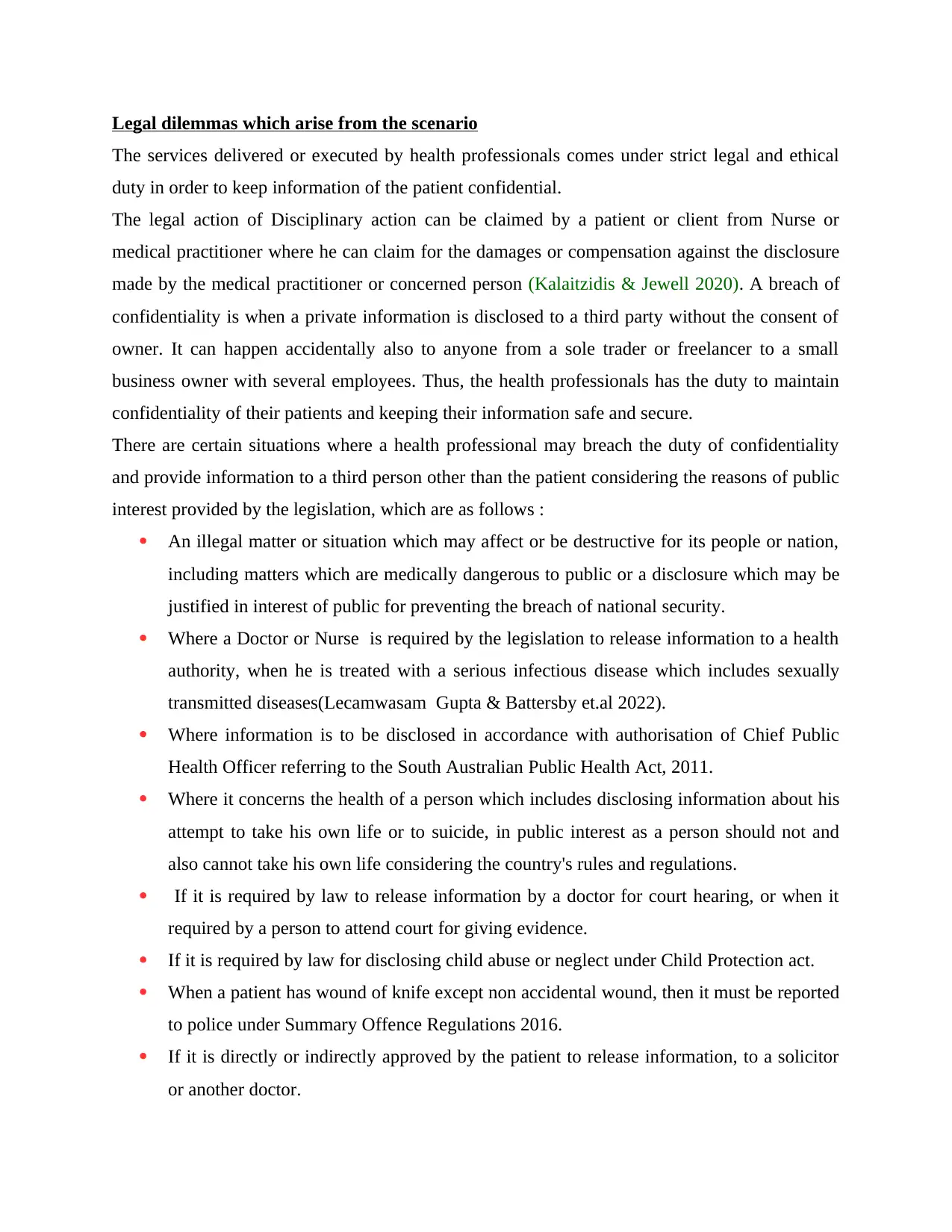
Legal dilemmas which arise from the scenario
The services delivered or executed by health professionals comes under strict legal and ethical
duty in order to keep information of the patient confidential.
The legal action of Disciplinary action can be claimed by a patient or client from Nurse or
medical practitioner where he can claim for the damages or compensation against the disclosure
made by the medical practitioner or concerned person (Kalaitzidis & Jewell 2020). A breach of
confidentiality is when a private information is disclosed to a third party without the consent of
owner. It can happen accidentally also to anyone from a sole trader or freelancer to a small
business owner with several employees. Thus, the health professionals has the duty to maintain
confidentiality of their patients and keeping their information safe and secure.
There are certain situations where a health professional may breach the duty of confidentiality
and provide information to a third person other than the patient considering the reasons of public
interest provided by the legislation, which are as follows :
An illegal matter or situation which may affect or be destructive for its people or nation,
including matters which are medically dangerous to public or a disclosure which may be
justified in interest of public for preventing the breach of national security.
Where a Doctor or Nurse is required by the legislation to release information to a health
authority, when he is treated with a serious infectious disease which includes sexually
transmitted diseases(Lecamwasam Gupta & Battersby et.al 2022).
Where information is to be disclosed in accordance with authorisation of Chief Public
Health Officer referring to the South Australian Public Health Act, 2011.
Where it concerns the health of a person which includes disclosing information about his
attempt to take his own life or to suicide, in public interest as a person should not and
also cannot take his own life considering the country's rules and regulations.
If it is required by law to release information by a doctor for court hearing, or when it
required by a person to attend court for giving evidence.
If it is required by law for disclosing child abuse or neglect under Child Protection act.
When a patient has wound of knife except non accidental wound, then it must be reported
to police under Summary Offence Regulations 2016.
If it is directly or indirectly approved by the patient to release information, to a solicitor
or another doctor.
The services delivered or executed by health professionals comes under strict legal and ethical
duty in order to keep information of the patient confidential.
The legal action of Disciplinary action can be claimed by a patient or client from Nurse or
medical practitioner where he can claim for the damages or compensation against the disclosure
made by the medical practitioner or concerned person (Kalaitzidis & Jewell 2020). A breach of
confidentiality is when a private information is disclosed to a third party without the consent of
owner. It can happen accidentally also to anyone from a sole trader or freelancer to a small
business owner with several employees. Thus, the health professionals has the duty to maintain
confidentiality of their patients and keeping their information safe and secure.
There are certain situations where a health professional may breach the duty of confidentiality
and provide information to a third person other than the patient considering the reasons of public
interest provided by the legislation, which are as follows :
An illegal matter or situation which may affect or be destructive for its people or nation,
including matters which are medically dangerous to public or a disclosure which may be
justified in interest of public for preventing the breach of national security.
Where a Doctor or Nurse is required by the legislation to release information to a health
authority, when he is treated with a serious infectious disease which includes sexually
transmitted diseases(Lecamwasam Gupta & Battersby et.al 2022).
Where information is to be disclosed in accordance with authorisation of Chief Public
Health Officer referring to the South Australian Public Health Act, 2011.
Where it concerns the health of a person which includes disclosing information about his
attempt to take his own life or to suicide, in public interest as a person should not and
also cannot take his own life considering the country's rules and regulations.
If it is required by law to release information by a doctor for court hearing, or when it
required by a person to attend court for giving evidence.
If it is required by law for disclosing child abuse or neglect under Child Protection act.
When a patient has wound of knife except non accidental wound, then it must be reported
to police under Summary Offence Regulations 2016.
If it is directly or indirectly approved by the patient to release information, to a solicitor
or another doctor.
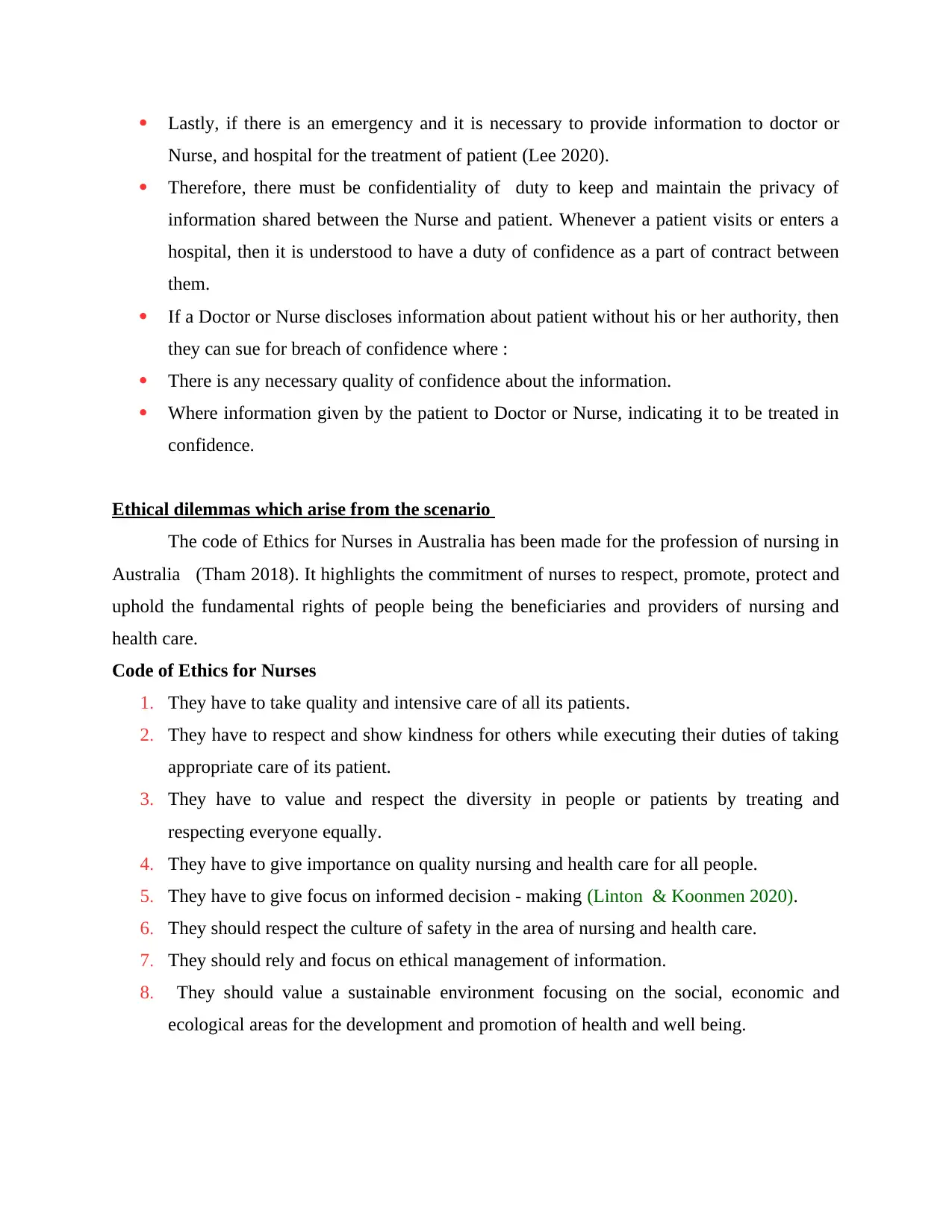
Lastly, if there is an emergency and it is necessary to provide information to doctor or
Nurse, and hospital for the treatment of patient (Lee 2020).
Therefore, there must be confidentiality of duty to keep and maintain the privacy of
information shared between the Nurse and patient. Whenever a patient visits or enters a
hospital, then it is understood to have a duty of confidence as a part of contract between
them.
If a Doctor or Nurse discloses information about patient without his or her authority, then
they can sue for breach of confidence where :
There is any necessary quality of confidence about the information.
Where information given by the patient to Doctor or Nurse, indicating it to be treated in
confidence.
Ethical dilemmas which arise from the scenario
The code of Ethics for Nurses in Australia has been made for the profession of nursing in
Australia (Tham 2018). It highlights the commitment of nurses to respect, promote, protect and
uphold the fundamental rights of people being the beneficiaries and providers of nursing and
health care.
Code of Ethics for Nurses
1. They have to take quality and intensive care of all its patients.
2. They have to respect and show kindness for others while executing their duties of taking
appropriate care of its patient.
3. They have to value and respect the diversity in people or patients by treating and
respecting everyone equally.
4. They have to give importance on quality nursing and health care for all people.
5. They have to give focus on informed decision - making (Linton & Koonmen 2020).
6. They should respect the culture of safety in the area of nursing and health care.
7. They should rely and focus on ethical management of information.
8. They should value a sustainable environment focusing on the social, economic and
ecological areas for the development and promotion of health and well being.
Nurse, and hospital for the treatment of patient (Lee 2020).
Therefore, there must be confidentiality of duty to keep and maintain the privacy of
information shared between the Nurse and patient. Whenever a patient visits or enters a
hospital, then it is understood to have a duty of confidence as a part of contract between
them.
If a Doctor or Nurse discloses information about patient without his or her authority, then
they can sue for breach of confidence where :
There is any necessary quality of confidence about the information.
Where information given by the patient to Doctor or Nurse, indicating it to be treated in
confidence.
Ethical dilemmas which arise from the scenario
The code of Ethics for Nurses in Australia has been made for the profession of nursing in
Australia (Tham 2018). It highlights the commitment of nurses to respect, promote, protect and
uphold the fundamental rights of people being the beneficiaries and providers of nursing and
health care.
Code of Ethics for Nurses
1. They have to take quality and intensive care of all its patients.
2. They have to respect and show kindness for others while executing their duties of taking
appropriate care of its patient.
3. They have to value and respect the diversity in people or patients by treating and
respecting everyone equally.
4. They have to give importance on quality nursing and health care for all people.
5. They have to give focus on informed decision - making (Linton & Koonmen 2020).
6. They should respect the culture of safety in the area of nursing and health care.
7. They should rely and focus on ethical management of information.
8. They should value a sustainable environment focusing on the social, economic and
ecological areas for the development and promotion of health and well being.
⊘ This is a preview!⊘
Do you want full access?
Subscribe today to unlock all pages.

Trusted by 1+ million students worldwide
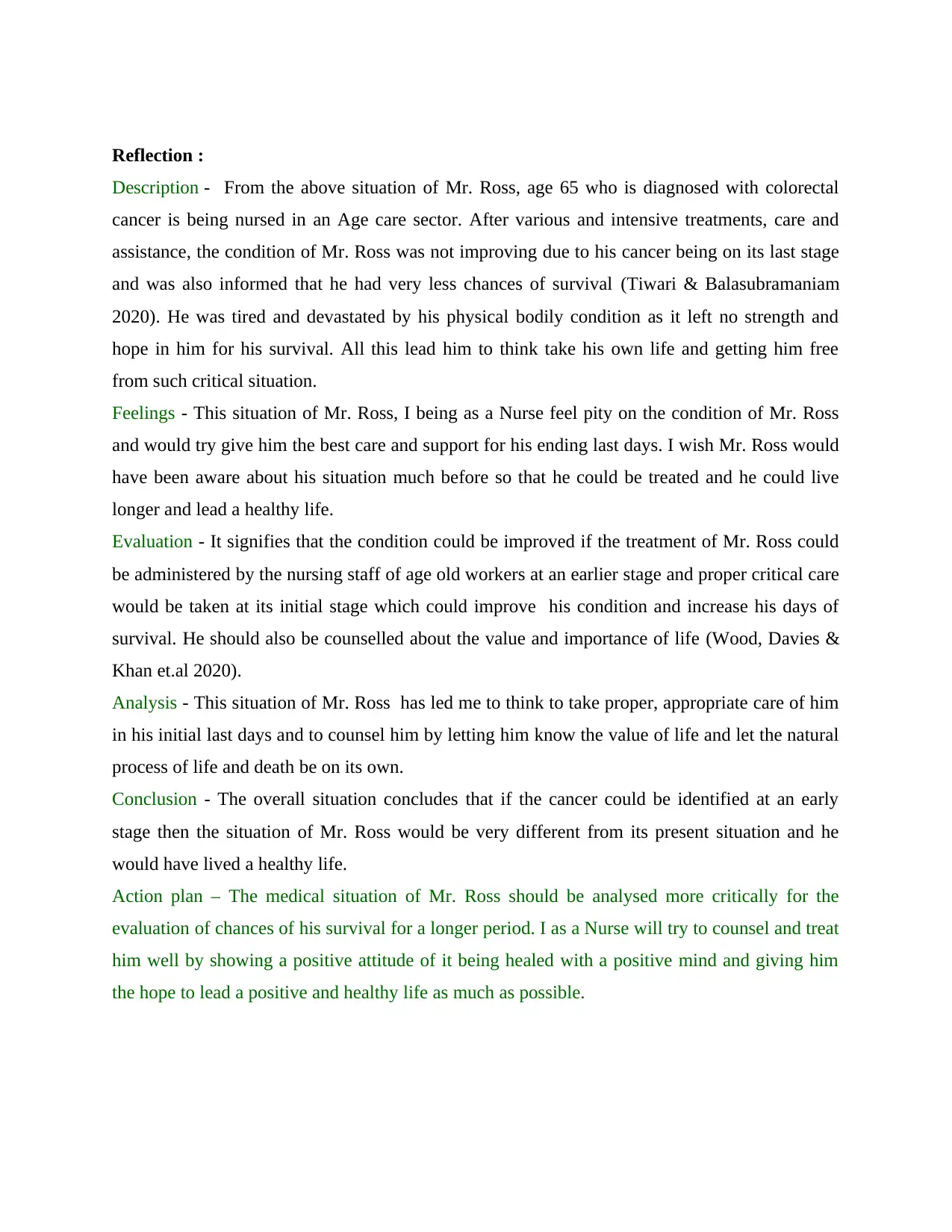
Reflection :
Description - From the above situation of Mr. Ross, age 65 who is diagnosed with colorectal
cancer is being nursed in an Age care sector. After various and intensive treatments, care and
assistance, the condition of Mr. Ross was not improving due to his cancer being on its last stage
and was also informed that he had very less chances of survival (Tiwari & Balasubramaniam
2020). He was tired and devastated by his physical bodily condition as it left no strength and
hope in him for his survival. All this lead him to think take his own life and getting him free
from such critical situation.
Feelings - This situation of Mr. Ross, I being as a Nurse feel pity on the condition of Mr. Ross
and would try give him the best care and support for his ending last days. I wish Mr. Ross would
have been aware about his situation much before so that he could be treated and he could live
longer and lead a healthy life.
Evaluation - It signifies that the condition could be improved if the treatment of Mr. Ross could
be administered by the nursing staff of age old workers at an earlier stage and proper critical care
would be taken at its initial stage which could improve his condition and increase his days of
survival. He should also be counselled about the value and importance of life (Wood, Davies &
Khan et.al 2020).
Analysis - This situation of Mr. Ross has led me to think to take proper, appropriate care of him
in his initial last days and to counsel him by letting him know the value of life and let the natural
process of life and death be on its own.
Conclusion - The overall situation concludes that if the cancer could be identified at an early
stage then the situation of Mr. Ross would be very different from its present situation and he
would have lived a healthy life.
Action plan – The medical situation of Mr. Ross should be analysed more critically for the
evaluation of chances of his survival for a longer period. I as a Nurse will try to counsel and treat
him well by showing a positive attitude of it being healed with a positive mind and giving him
the hope to lead a positive and healthy life as much as possible.
Description - From the above situation of Mr. Ross, age 65 who is diagnosed with colorectal
cancer is being nursed in an Age care sector. After various and intensive treatments, care and
assistance, the condition of Mr. Ross was not improving due to his cancer being on its last stage
and was also informed that he had very less chances of survival (Tiwari & Balasubramaniam
2020). He was tired and devastated by his physical bodily condition as it left no strength and
hope in him for his survival. All this lead him to think take his own life and getting him free
from such critical situation.
Feelings - This situation of Mr. Ross, I being as a Nurse feel pity on the condition of Mr. Ross
and would try give him the best care and support for his ending last days. I wish Mr. Ross would
have been aware about his situation much before so that he could be treated and he could live
longer and lead a healthy life.
Evaluation - It signifies that the condition could be improved if the treatment of Mr. Ross could
be administered by the nursing staff of age old workers at an earlier stage and proper critical care
would be taken at its initial stage which could improve his condition and increase his days of
survival. He should also be counselled about the value and importance of life (Wood, Davies &
Khan et.al 2020).
Analysis - This situation of Mr. Ross has led me to think to take proper, appropriate care of him
in his initial last days and to counsel him by letting him know the value of life and let the natural
process of life and death be on its own.
Conclusion - The overall situation concludes that if the cancer could be identified at an early
stage then the situation of Mr. Ross would be very different from its present situation and he
would have lived a healthy life.
Action plan – The medical situation of Mr. Ross should be analysed more critically for the
evaluation of chances of his survival for a longer period. I as a Nurse will try to counsel and treat
him well by showing a positive attitude of it being healed with a positive mind and giving him
the hope to lead a positive and healthy life as much as possible.
Paraphrase This Document
Need a fresh take? Get an instant paraphrase of this document with our AI Paraphraser
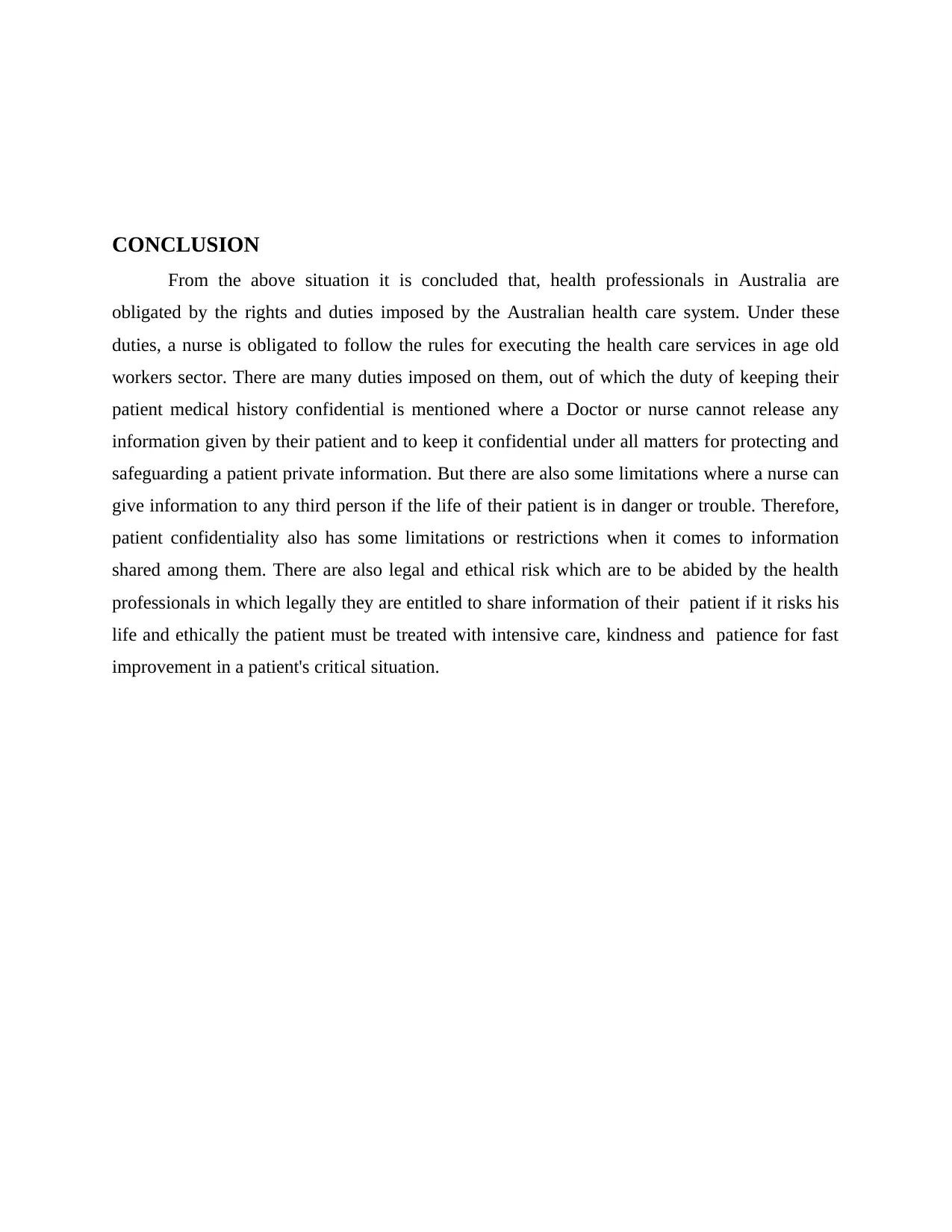
CONCLUSION
From the above situation it is concluded that, health professionals in Australia are
obligated by the rights and duties imposed by the Australian health care system. Under these
duties, a nurse is obligated to follow the rules for executing the health care services in age old
workers sector. There are many duties imposed on them, out of which the duty of keeping their
patient medical history confidential is mentioned where a Doctor or nurse cannot release any
information given by their patient and to keep it confidential under all matters for protecting and
safeguarding a patient private information. But there are also some limitations where a nurse can
give information to any third person if the life of their patient is in danger or trouble. Therefore,
patient confidentiality also has some limitations or restrictions when it comes to information
shared among them. There are also legal and ethical risk which are to be abided by the health
professionals in which legally they are entitled to share information of their patient if it risks his
life and ethically the patient must be treated with intensive care, kindness and patience for fast
improvement in a patient's critical situation.
From the above situation it is concluded that, health professionals in Australia are
obligated by the rights and duties imposed by the Australian health care system. Under these
duties, a nurse is obligated to follow the rules for executing the health care services in age old
workers sector. There are many duties imposed on them, out of which the duty of keeping their
patient medical history confidential is mentioned where a Doctor or nurse cannot release any
information given by their patient and to keep it confidential under all matters for protecting and
safeguarding a patient private information. But there are also some limitations where a nurse can
give information to any third person if the life of their patient is in danger or trouble. Therefore,
patient confidentiality also has some limitations or restrictions when it comes to information
shared among them. There are also legal and ethical risk which are to be abided by the health
professionals in which legally they are entitled to share information of their patient if it risks his
life and ethically the patient must be treated with intensive care, kindness and patience for fast
improvement in a patient's critical situation.
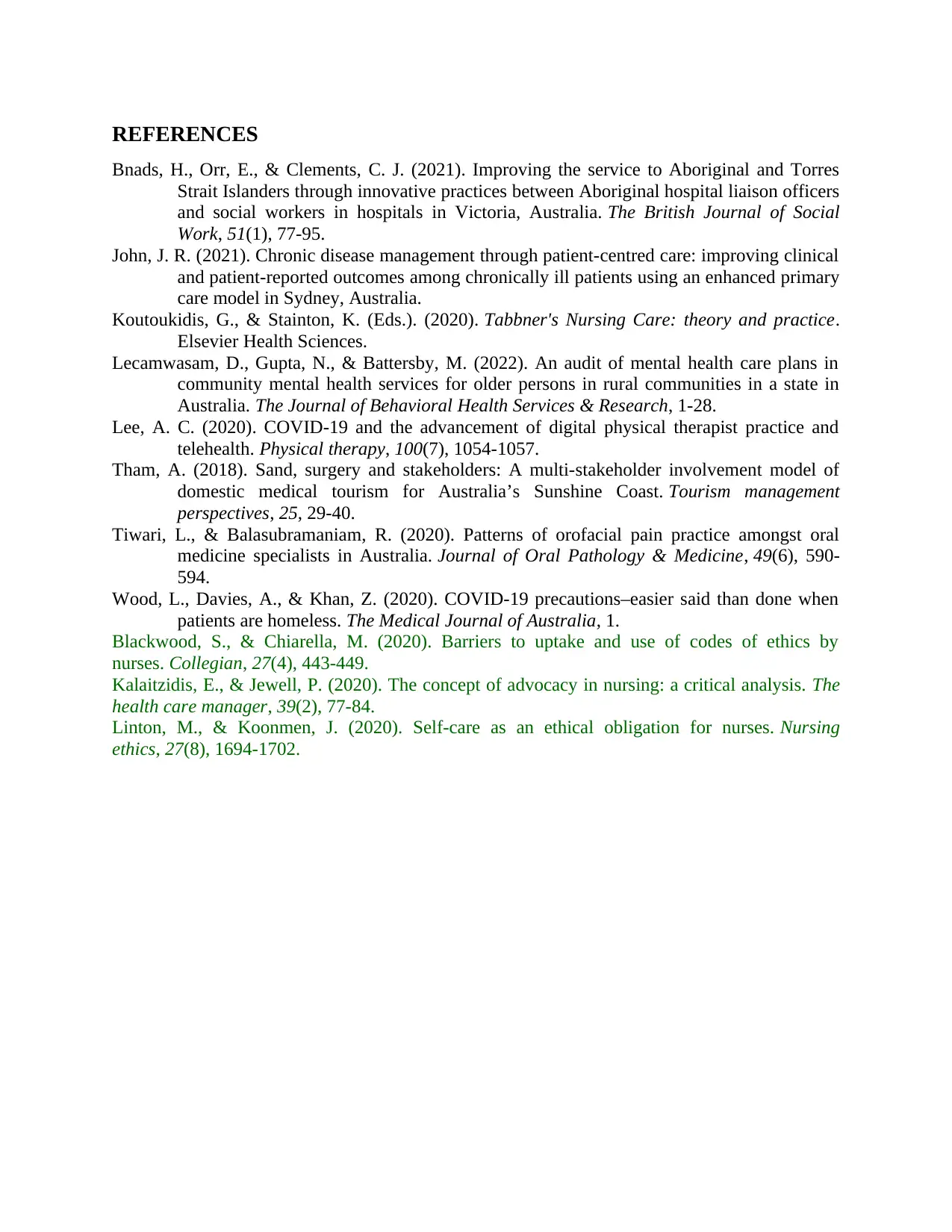
REFERENCES
Bnads, H., Orr, E., & Clements, C. J. (2021). Improving the service to Aboriginal and Torres
Strait Islanders through innovative practices between Aboriginal hospital liaison officers
and social workers in hospitals in Victoria, Australia. The British Journal of Social
Work, 51(1), 77-95.
John, J. R. (2021). Chronic disease management through patient-centred care: improving clinical
and patient-reported outcomes among chronically ill patients using an enhanced primary
care model in Sydney, Australia.
Koutoukidis, G., & Stainton, K. (Eds.). (2020). Tabbner's Nursing Care: theory and practice.
Elsevier Health Sciences.
Lecamwasam, D., Gupta, N., & Battersby, M. (2022). An audit of mental health care plans in
community mental health services for older persons in rural communities in a state in
Australia. The Journal of Behavioral Health Services & Research, 1-28.
Lee, A. C. (2020). COVID-19 and the advancement of digital physical therapist practice and
telehealth. Physical therapy, 100(7), 1054-1057.
Tham, A. (2018). Sand, surgery and stakeholders: A multi-stakeholder involvement model of
domestic medical tourism for Australia’s Sunshine Coast. Tourism management
perspectives, 25, 29-40.
Tiwari, L., & Balasubramaniam, R. (2020). Patterns of orofacial pain practice amongst oral
medicine specialists in Australia. Journal of Oral Pathology & Medicine, 49(6), 590-
594.
Wood, L., Davies, A., & Khan, Z. (2020). COVID-19 precautions–easier said than done when
patients are homeless. The Medical Journal of Australia, 1.
Blackwood, S., & Chiarella, M. (2020). Barriers to uptake and use of codes of ethics by
nurses. Collegian, 27(4), 443-449.
Kalaitzidis, E., & Jewell, P. (2020). The concept of advocacy in nursing: a critical analysis. The
health care manager, 39(2), 77-84.
Linton, M., & Koonmen, J. (2020). Self-care as an ethical obligation for nurses. Nursing
ethics, 27(8), 1694-1702.
Bnads, H., Orr, E., & Clements, C. J. (2021). Improving the service to Aboriginal and Torres
Strait Islanders through innovative practices between Aboriginal hospital liaison officers
and social workers in hospitals in Victoria, Australia. The British Journal of Social
Work, 51(1), 77-95.
John, J. R. (2021). Chronic disease management through patient-centred care: improving clinical
and patient-reported outcomes among chronically ill patients using an enhanced primary
care model in Sydney, Australia.
Koutoukidis, G., & Stainton, K. (Eds.). (2020). Tabbner's Nursing Care: theory and practice.
Elsevier Health Sciences.
Lecamwasam, D., Gupta, N., & Battersby, M. (2022). An audit of mental health care plans in
community mental health services for older persons in rural communities in a state in
Australia. The Journal of Behavioral Health Services & Research, 1-28.
Lee, A. C. (2020). COVID-19 and the advancement of digital physical therapist practice and
telehealth. Physical therapy, 100(7), 1054-1057.
Tham, A. (2018). Sand, surgery and stakeholders: A multi-stakeholder involvement model of
domestic medical tourism for Australia’s Sunshine Coast. Tourism management
perspectives, 25, 29-40.
Tiwari, L., & Balasubramaniam, R. (2020). Patterns of orofacial pain practice amongst oral
medicine specialists in Australia. Journal of Oral Pathology & Medicine, 49(6), 590-
594.
Wood, L., Davies, A., & Khan, Z. (2020). COVID-19 precautions–easier said than done when
patients are homeless. The Medical Journal of Australia, 1.
Blackwood, S., & Chiarella, M. (2020). Barriers to uptake and use of codes of ethics by
nurses. Collegian, 27(4), 443-449.
Kalaitzidis, E., & Jewell, P. (2020). The concept of advocacy in nursing: a critical analysis. The
health care manager, 39(2), 77-84.
Linton, M., & Koonmen, J. (2020). Self-care as an ethical obligation for nurses. Nursing
ethics, 27(8), 1694-1702.
⊘ This is a preview!⊘
Do you want full access?
Subscribe today to unlock all pages.

Trusted by 1+ million students worldwide
1 out of 9
Related Documents
Your All-in-One AI-Powered Toolkit for Academic Success.
+13062052269
info@desklib.com
Available 24*7 on WhatsApp / Email
![[object Object]](/_next/static/media/star-bottom.7253800d.svg)
Unlock your academic potential
Copyright © 2020–2026 A2Z Services. All Rights Reserved. Developed and managed by ZUCOL.





